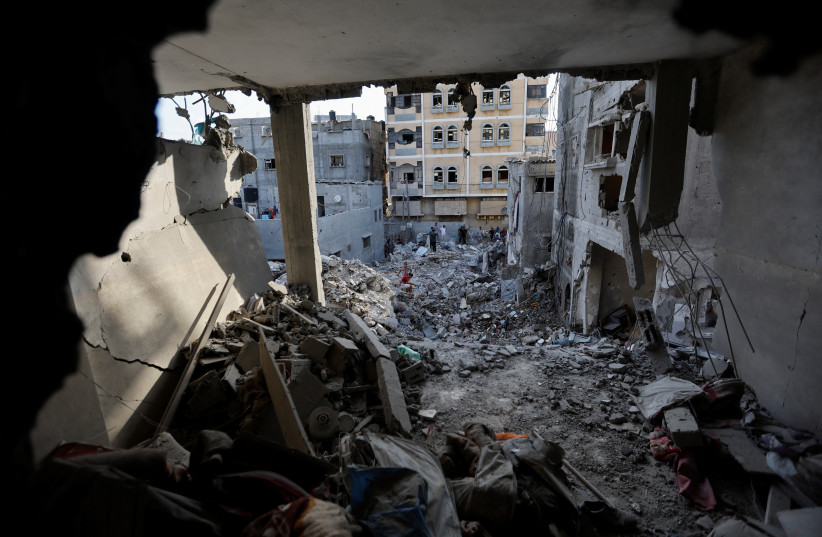Former IDF intelligence chief Tamir Heyman and other top defense officials consider the assassination of senior Islamic Jihad Gaza commander Baha abu al-Ata in 2019 as one of the high points of their tenure.
They have said that removing him from the board left Islamic Jihad more moderate and less ready to shower Israel’s home front with rockets.
Many officials from the same circles are complimenting Israel’s current Operation Breaking Dawn for having led to eliminating a series of top Islamic Jihad officials, notably including abu al-Ata’s replacement, Tayseer al-Jabari.
But is this what success looks like?
In November 2019, Israel faced hundreds of rockets across the home front in a matter of days as the price for killing abu al-Ata.

Though it was not as if Islamic Jihad needed a reason to decide to attack Israel, Jerusalem’s aggressive move certainly broughy about a larger reaction.
If that attack had bought 10 years of quiet or even five, maybe Israelis might have viewed it as worth it.
But the next full war with Gaza was less than two years later in May 2021.
And now over 400 rockets have been fired on the Israeli home front in a matter of days by Islamic Jihad in revenge for a mix of the arrest of the terror group’s West Bank chief Bassem Saadi as well as killing al-Jabari.
It suddenly seems less clear that killing abu al-Ata achieved quiet for very long.
Moreover, if the point of killing him was because he would be hard to replace and to get someone more moderate, then why has the IDF had to rush in so fast to kill his successor?
Those who view the current operation as a success can cite a host of positive tactical figures: many Islamic Jihad top officials have been killed, not just one, many of its assets have been destroyed by dozens of airstrikes, their rockets so far have hit Israel less and killed fewer civilians than in prior skirmishes due to iron dome’s improved proficiency and the world seems to be happy to let Jerusalem hit Islamic Jihad without too much criticism – as long as the conflict ends soon.
Tactical victories
Yet, these are all tactical victories. It is not as if abu al-Ata and al-Jabari were unique, 70-year-old men who had irreplaceable experiences. Abu al-Ata was only in his 40s and al-Jabari was only 50.
Famously, US generals in Vietnam kept their White House and Pentagon supervisors happy by providing statistics on the number of enemy fighters killed. Despite those high numbers, Washington was failing to achieve any strategic improvement in its situation against the North Vietnamese.
What will stop the next 40-year-old Islamic Jihad leader from firing rockets on Israel in six months or two years?
And put aside the 40-and 50-year-olds. Most of the movement is made up of young adolescents with many mid-level commanders in their 20s, just like in the IDF.
To fire rockets or give orders to fire rockets, one does not need to have decades of experience or be a rocket scientist Islamic Jihad is about as low-tech and low-maintenance as a terror group comes. As long as Gaza and Israel are in conflict, it will be able to depend on a steady stream of radical adolescents who want action against the Jewish state.
Even if some of its fighters are not as religious as the terror group would like them to be, they have become the tip of the spear in Gaza against Israel as opposed to Hamas, which has become much more of a status quo power fearing major conflicts.
They can manufacture rockets at home at an incredibly low cost and all they need to do is fire a smattering and the entire Israeli south closes down, whether anyone dies in the attacks or not. Fire a few longer-range rockets toward the center of the country and Tel Aviv and a majority of the country will be running in panic to bomb shelters.
So after all of the compliments about the IDF’s undeniable tactical prowess, Israel will remain with the same strategic problems after this operation and may face another round of rockets in a year or two.
There are broader solutions: a deeper ground forces operation into Gaza that truly deters both Hamas and Islamic Jihad or an aggressive diplomatic horizon with the Palestinian Authority that reduces support internally for Gaza’s present rulers
In addition, there are other medium-term creative solutions like giving Gaza an artificial port to open it up further to the world in exchange for a longer-term ceasefire with Hamas.
But no Israeli government for well over a decade has seriously considered any of these options for changing the strategic situation in which a poor, poorly armed rag-tag terror group can bring the Middle East’s premier power to its knees, at least for a few days, anytime it chooses.
